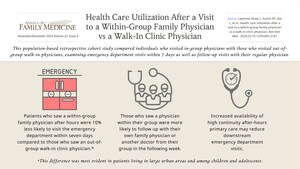Annals of Family Medicine: Study Examines Long-Term Effects of Physician-Patient Relations on Functional Health
ANN ARBOR, Mich., Sept. 15, 2020 /PRNewswire/ -- One aspect of quality medical care is the quality of physician-patient relations, according to a study from Case Western Reserve University published in the current issue of Annals of Family Medicine.
"The quality of physician-patient relationship warrants closer research," the study authors write. "Prior studies have not yet clarified how changes in this fundamental relationship, occurring over time, impacts health outcomes."
The research team classified patients into six mutually exclusive doctor-patient relationship trajectories over one year (from 2015 to 2016) and then looked for associations between trajectories and change in patient functional health after one year.
The authors utilized secondary data extracted from the Medical Expenditure Panel Survey (MEPS), which provides a nationally representative and "rich array of process and outcome data for health services research," as they describe it. The survey asks questions such as "How often did doctors or other health providers listen carefully to you?" and "How often did doctors or other health providers explain things in a way that were easy to understand?"
Functional health outcomes were measured by the Short Form Survey (SF-12) quality of life questionnaire, a standard measure of how well a patient is faring in areas such as general health, physical functioning, and body pain.
Regardless of patients' baseline relationship with their physician, improved relationship trajectories for the one-year interval were associated with improved functional health. Furthermore, both flat physician-patient trajectories and worsened relationship trajectories were associated with worsened functional health.
The results of this study demonstrate a correlation between physician-patient relationship trajectory and change in patient functional health outcomes. However, correlation does not convincingly prove causation. Further intervention research is required to convincingly show that improving the physician-patient relationship trajectories result in improve functional health outcomes for patients.
"Relationship-centered care may be especially important among adults with a disproportionate burden of chronic diseases, who represent a growing subpopulation in the United States," the authors write. "These findings may inform healthcare strategies and health policy aimed at improving patient-centered health outcomes."
Assessing the Longitudinal Impact of Physician-Patient Relationship on Functional Health
R. Henry Olaisen, MPH, PhD, et al
Case Western Reserve University, Department of Population and Quantitative Health Sciences, Cleveland, Ohio
SOURCE Annals of Family Medicine

Related Links
WANT YOUR COMPANY'S NEWS FEATURED ON PRNEWSWIRE.COM?
Newsrooms &
Influencers
Digital Media
Outlets
Journalists
Opted In






Share this article